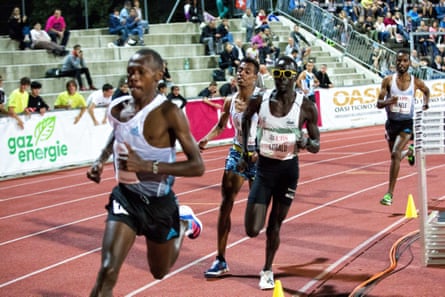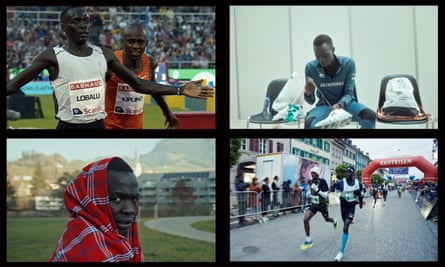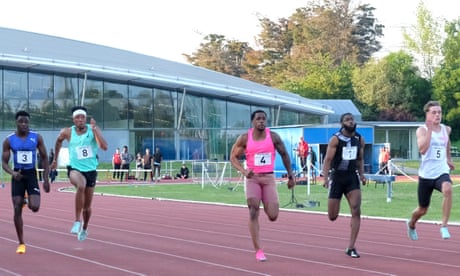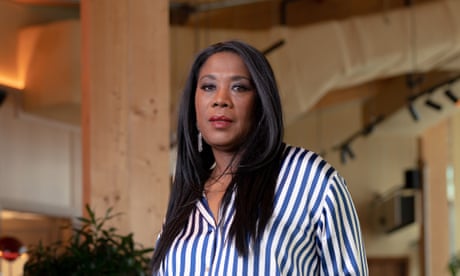June 18, 2023
I found this story incredible to read explaining how someone can come out of a terrible first part of their life and still show the grace and fortitude to succeed in some aspect of life. The pain in the late stages of a hotly contested race is probably minimalist compared to what he has gone through while growing up.
The other part of this article is mind boggling when it tries to explain what an international bureacracy can create to ignore or recognize a human being's right to exist and compete against one's equals.
If athletes from Russia can compete under the Olympic Flag, why can't Lobalu do the same? Bill Schnier
The following story appeared in The Guardian today but originated in The Observer written by Ben Bloom.
‘I’m born to suffer’: refugee athlete Dominic Lobalu on race to find a home
Saga of the stateless elite runner and the Swiss school teacher who saw his talent is the subject of a new documentary
The scene is the closing stages of last year’s Stockholm Diamond League 3,000 metres. Jacob Kiplimo, Uganda’s half marathon world record holder and an Olympic medalist, heads a quartet of runners approaching the final bend on his way to what is expected to be a routine win. Trailing him are Kenya’s Cornelius Kemboi and Stewart McSweyn of Australia. We know that because the commentator says so. The fourth of the leading pack is an unidentified man in a plain white singlet.
Entering the home straight, the man in white moves into second place. Grasping for his name, the commentator suggests it is an athlete from Burundi. He is wrong, but the man in white is accustomed to being invisible. Only when the man pulls alongside Kiplimo and passes him approaching the finish line does the commentator realise his error, correctly identifying a life-changing victory for Dominic Lobalu.
Where most athletes have their national flag next to their name, Lobalu has the letters ART, denoting the Athlete Refugee Team. But he does not represent them. Nor does he represent South Sudan, the country of his birth, or Switzerland, the country where he now lives. Lobalu is stateless; a refugee and asylum seeker with no official nationality.
At this moment, all that can be forgotten. For now, he is just a man running the race of his life, beating some of the sport’s biggest names and catapulting himself on to a stage of which he has only ever dreamed. “That is a transformation from being an also-ran on the international scene to being a superstar,” concludes the commentator.

The 24-year-old Lobalu is the first refugee athlete to turn professional, but his lack of national identity means he cannot compete at this summer’s world championships or next year’s Olympics. While the wheels of an asylum application grind painfully slowly, his destiny remains stubbornly out of reach, robbing him of the thing he desires most.
“I’m just telling myself I’m born to suffer,” he says, flashing a broad smile that contrasts alarmingly with the words coming out of his mouth in a new documentary film entitled The Right to Race, released for World Refugee Day on Tuesday 20 June . “Everywhere I go, I expect tough. So it comes, it is normal. But I’m having a good life.”
Born in the remote village of Chukudum in what would later become South Sudan, Lobalu was nine when he lost his parents in the brutal civil war that preceded independence from Sudan and fled over the nearby border to Kenya, where he became separated from his four sisters. Via an orphanage just north of Nairobi, he was offered a place at the nearby Tegla Loroupe Peace Foundation – an athletics training camp, which forms the basis of the Athlete Refugee Team.
He competed for them at the 2017 London world championships – “It was my first time on a plane, it was like I’m dreaming” – finishing only in front of a lone Dutch runner, who had tripped and fallen. Yet two years later, he took the snap decision to abscond after a race in Geneva, in part due to discontent at life in the athletics camp, in part in search of better things. He prefers not to dwell on it, saying: “I don’t want to talk about it. I don’t like to remind myself what I have passed through.”
Lobalu had no idea what lay in wait when he left the team hotel before dawn on a chilly May morning in 2019 with no money in his pocket and only the clothes on his back. “The situation I came from was hard,” he says. “So it’s better for me to try new things.”
Some months later, a Swiss secondary school teacher and part-time athletics coach, Markus Hagmann, received a call from an immigration officer informing him there was an asylum seeker who wanted to run. “Within the first 200m I could see something in him,” says Hagmann. “But his body and mind were marked from his journey – there was a lot of work to do to make him feel comfortable.” Lobalu says: “It took a lot for me to trust him because the life I had before I didn’t trust anybody. It took time.”

Together, they worked in St Gallen, where Lobalu was placed in an apartment along with two other asylum seekers, sowing the seeds for a spectacular 2022 breakthrough year that included victory in Stockholm on his Diamond League debut and a time quicker than the European record at the Copenhagen half marathon. But he does not yet count as European.
after newsletter promotion
Now he is no longer permitted to compete for the Athlete Refugee Team, World Athletics is sympathetic to his plight but the global governing body say it cannot allow him to race at major competitions as a neutral for fear of encouraging other refugees to follow his path.
“His story, some of it is frustrating, some of it is sad,” says the governing body’s spokesperson Jackie Brock-Doyle. “We’re not without a huge amount of empathy for him. But it’s important that there are processes that we have that he needs to fit within to get what he wants across the line.”
Waiting for Swiss citizenship is an impossibly long process, so the Swiss Athletics Federation has applied to World Athletics for a transfer of allegiance. Any timeframe is unknown, leaving Lobalu dreaming of a place at next year’s Olympics, where he would be a medal contender.
“It is very important because there are other people where I come from whose life is too hard,” he says. “Some will have that talent but because of where they come from they don’t believe it. I want to be an example to show them that whatever you want to do, put it in your heart and do it with your whole passion.”
And if the bureaucratic chips do not fall in his favour, he will simply continue running wherever he can: “I can breathe well, and I have freedom. I enjoy my life. I am happy.”
The Right to Race screens on Eurosport 1 on Tuesday, World Refugee Day, and is available to watch on www.RighttoRace.com






No comments:
Post a Comment